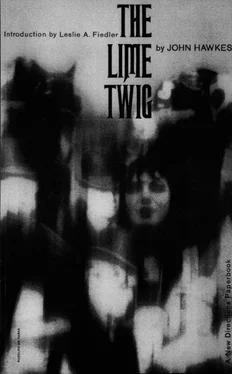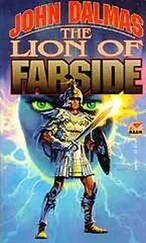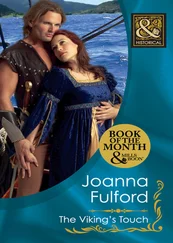A quartet of scar-faced Negroes was playing something Banks had first heard out of gramophones in Violet Lane, something whistled by the factory girls on their way to work. No favorite now, no waltz carried on the tones of an old comet, but music that set him trying to pump Syb’s hand up and down in time with the piano player’s tapping shoe. There was a trumpet, a marimba and bass and the piano on which a white girl was supposed to sit and sing. Beside his bench was a flabby fern in a bucket and the piano player kept a bottle there, under the dead green leaves. Banks could clearly hear the fellow’s foot going above the syncopation of the racy song.
Banks had never learned to dance but he was dancing now. He pumped her hand and Syb wasn’t afraid to move, wasn’t afraid to laugh, and he found her spangled slippers everywhere he stepped and saw the drops of candlelight — on the tables there were candles fixed to the bottoms of inverted tumblers — swelling the tiny pearls pushed into the fiery hair. For a moment, admiring the decorative row of pearls, he thought of the faces children model out of bread dough and of the eyes they fashion by sinking raisins into the dough with their stubby thumbs. Then, with the hand on her waist, he felt a bit of Sybilline’s blouse pulling out of her skirt and heard her voice, flitting everywhere fast as her feet, saying, “Let’s have a drink-up, Mike, a rum and a toss. …”
The room was filled with people from the Damps — a racing crowd. In this room in the town surrounded by farm and vicarage and throaty nightingale there were people who did their banking in High Fleet Seven and others who did their figuring in the slums, all sporting now — it was the night before the running of the Golden — and ordering Spumoni’s best. Like a theater crowd, a society in which the small person of Needles could go unnoticed, though wearing rainbow silks and cap and a numbered placard on his puffy sleeve. And Banks felt that he too went unnoticed, felt that he could drink and dance and breathe unobserved at last. There were enormous black-and-white paintings of horses about the walls along with the penciled handwritten names of endless guests. There was the odor of whisky and Italian cooking, and the Negroes never ceased their melody of love and Lambeth Walk.
“Coo, Mike,” she said just before they reached the table, “it’s going to be a jolly evening.” In Syb’s voice he heard laughter, motor cars and lovely moonlit trees, beds and silk stockings in the middle of the floor.
Glasses in hand they did not sit, but stood beside the table, because she wanted to dance again and couldn’t bear sitting down. They held hands while the small exsoldier poured and Needles sucked in his cigarette and looked up at him.
“Mr. Banks,” and it was Larry, lifting the fork, letting the candle shine across his face, “feeling a little better now?”
“Quite nicely, thanks,” he answered.
“Bottom’s up!” the girl said suddenly, and swallowed off the wine, balancing against his arm and tilting so that he saw the heart throb, the wine’s passage down the throat from which she was capable of laughing, crying, whispering. So he drank also and it was the hard dry dusty taste of wine and he was warmed and pleasurably composed. He remembered not the Baths, the Damps, poor wretched Cowles, nor the rooms in Dreary Station, but a love note he had written at the age of twelve when the city was on fire. And remembering it he looked at Sybilline and saw in her eyes the eyes of an animal that has seen a lantern swinging on a blackened hill.
“Excuse us,” he said, and put down the glass. “This is our melody.”
In his arms she was like the women he had thought of coming out of comfort rooms. Or it was what they had done in the shelters or when the bands were marching — upright, holding each other close before the parting. One of his hands was on her body and the sequins kept falling off her blouse to the floor. They were dancing on sequins. He was able now, while holding her, to try and tuck in the blouse.
“It’s shrunk,” she murmured, “it’ll never stay.” But his fingers pushed in the cloth, and over the top of her auburn head he saw the piano player leaning to drink from the bottle pulled out of the bucket and saw the marimba player’s black dusty hands — there was a big gold wedding band on one finger — shaking, trembling in mid-air. Everyone was talking horses, talking the Golden, but he was moving round the little floor with Syb.
“You know,” pulling her head away from his brown lapels, but dancing, dancing, “that other chap was hopeless. Wouldn’t even buy me an ice. But whatever did you do with his binoculars?”
He waited and then: “Gave them to a fellow selling tickets.”
Later still, when she happened to see the jockey holding his head and Sparrow slipping something to the waiter — a Neapolitan with dirty shirt and mustaches — when the candles were softly dying and the wine was dregs — and still they were turning on the floor — then she laughed, spoke against his chest: “It’ll be a jolly evening, Mike. I promise. We’ll go to bed and you’ll like my bed, Michael. …” And then in the middle of the floor with the others watching and Larry pulling sharply on his coat over the holster, sending Needles out for the hired car, then she gave him her own lips soft, venereal, sweet and tasting of sex.
But Sparrow stopped them kissing, tapped on his arm. “Come now, Banks, Larry says we’re going to a proper place.”
SIDNEY SLYTER SAYS
Marlowe’s Pippet Smart in Practice Whirls …
Rock Castle Proves Ancient Champion …
Mystery Horse Possesses Danish Blood …
Harry Bailey of Poor Petitioners, Cock & Crown, East End, how right you were! Fly up to Aldington, Mr. Bailey, fly to Aldington with your poor lame sister, for Sidney Slyter says he needs you now! Five pounds? Not half enough, I’d say! Sidney — God’s silent servant — Sidney Slyter has his brimming glass, his fags, lighter embossed with crop and stirrup, his hotel beds, and ladies to converse with in the bars; has his hard sporting eyes red-rimmed or not and under his titfor leaves of information about the horses ever growing bone from bone and blood into blood. And Sidney Slyter’s got God’s own careless multitude to shelter in enjoyment and the luck of sport. But Mr. Bailey, my friend, it took you puzzling over the problem while rubbing your dog’s worn ear and hearing the dreams of your ever-innocent lame partner to perceive directly the horror at the end of our journey, you to phrase the spoils of our fate! The horse will win … the horse will win. … Amazing, Mr. Bailey, just amazing. … Because Eddie Reeves came ringing through my wires at 4 A.M. and what he read me was an accolade proper for the obituary of the King of the Turf: He’s run the Golden before, Sidney. Hear me Sidney? Entered in The Golden Bowl three times and three times the winner. Hear me Sidney? Then the dates; then Eddie coughing through the dawn; then the minutes of each winning race. Then reading on: Draftsman by Emperor’s Hand out of Shallow Draft by Amulet; Castle Churl by Draftsman out of Likely Castle by Cold Masonry; Rock Castle by Castle Churl out of Words on Rock by Plebeian — Bred by the Prince of Denmark, Sidney, bred by the Prince and commanded to win by the Prince and ordained to win by the Prince and forebears of that line, too. And by his order — just to get the royal stamp on him, Sidney — the King’s own surgeon transplanted a bone fragment from the skull of Emperor’s Hand into Rock Castle’s skull. Then presented by the Prince of Denmark to Lady Harvey-Harrow on her sixteenth birthday. The horse will win, Sidney, the horse will win . … Rigid; fixed; a prison of heritage in the victorious form; the gray shape that forever rages out round the ring of painted horses with the band music piping and clacking; indomitable. And somebody knew all this already, and it wasn’t Mr. Banks. But who? Sidney Slyter wants to know: and Sidney Slyter wants to know what’s the matter with Mr. Michael Banks. …
Читать дальше












